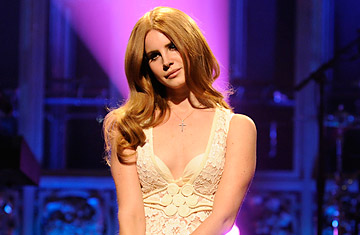
Lana del Rey
(2 of 2)
The problem is that the entertainment industry has decided that Del Rey is an important artist whether we like it or not. But pop audiences are intensely meritocratic--that's why we love American Idol. If we don't get to vote on our musicians, we expect them to prove their worth by touring, woodshedding and building a body of work. Del Rey is getting the superstar treatment by fiat; she's a fledgling talent stuck in a costume that won't come off.
That's a pity, because Born to Die is a likable and promising album. The solid core of Del Rey's sound is movie music, both the kind that accompanied midcentury Hollywood films (sweeping strings, fairy-dust harp, ominous timpani) and the kind heard in them now (floor-shaking bass tones, flashes of atmospheric noise). Her innovation is to sneak the cadences of hip-hop into throwback torch songs; several of her choruses are itching to be repurposed for rap tracks.
Del Rey has described her aesthetic as "Lolita got lost in the hood," and she means it. The song on Born to Die called "Lolita" is neither the one that quotes the opening passage of Vladimir Nabokov's novel nor the one that mentions the heart-shaped sunglasses that Sue Lyon wears in the 1962 film version. In Nabokov's book, Lolita is an invented identity with a grandiose mythology and immense expectations attached to it. It's an identity forced on someone who didn't choose it, and it silences and ruins her. Lana Del Rey might do well to keep that in mind.
